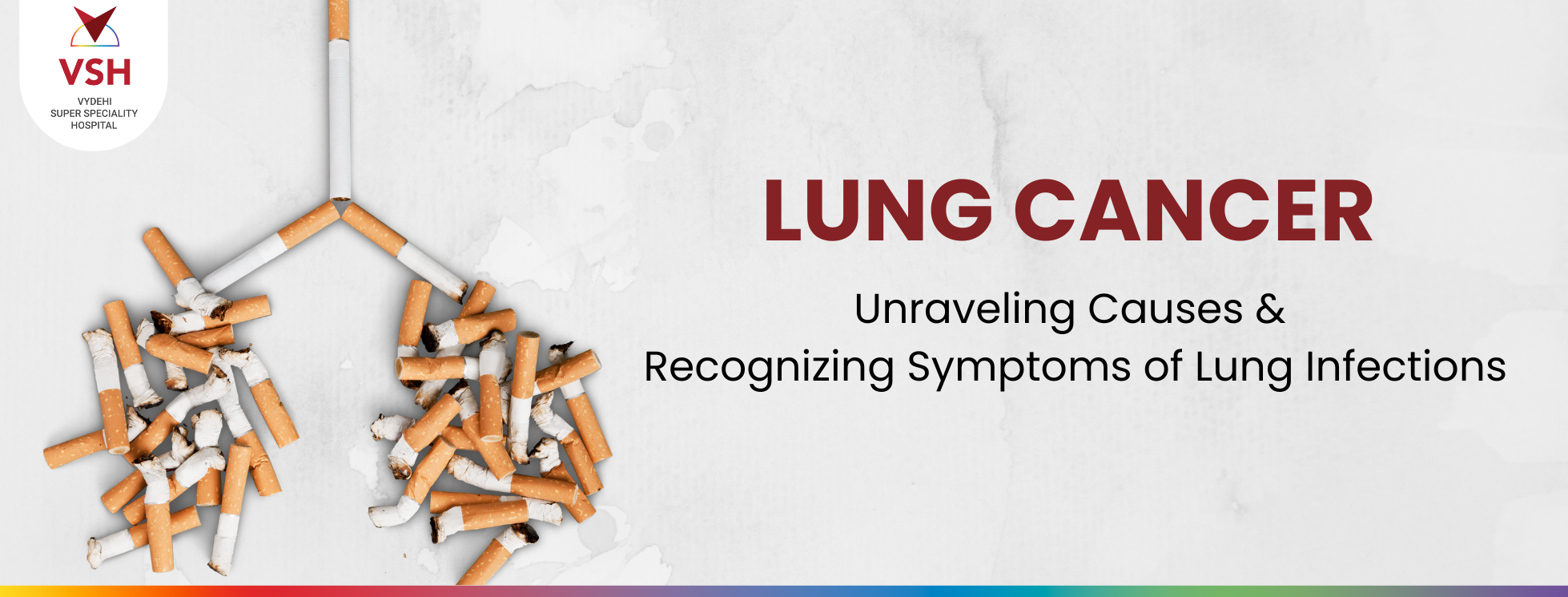
Lung cancer is a formidable health concern, affecting millions of individuals worldwide. Understanding its root causes and recognizing early symptoms are critical for prompt detection and effective treatment. Additionally, lung infections can also pose significant health risks, especially for the elderly. In this comprehensive blog, we will delve into the intricate world of lung cancer, explore the causes of lung infections, and shed light on the potential link between lung infections and lung cancer.
Determining what causes lung cancer is paramount in combating this deadly disease. The primary risk factor is tobacco smoking, which exposes the lungs to carcinogens, leading to cancerous growth. Exposure to secondhand smoke, radon, asbestos, and air pollution can also elevate the risk of developing lung cancer.
Recognizing the symptoms of lung cancer is vital for early diagnosis and improved treatment outcomes. Persistent cough, chest pain, difficulty breathing, coughing up blood, unexplained weight loss, and recurring respiratory infections are some common signs that warrant medical attention.
Lung infections can be caused by various pathogens, including bacteria, viruses, or fungi. The weakened immune system, exposure to pollutants, and underlying respiratory conditions contribute to the development of lung infections.
Symptoms of a lung infection may include persistent cough, fever, shortness of breath, chest pain, phlegm production, and fatigue. Prompt medical evaluation and treatment are crucial to prevent complications.
While lung infections themselves do not directly cause lung cancer, they can be potential risk factors. Chronic lung infections, such as tuberculosis or bronchitis, can cause repeated inflammation and damage to lung tissue, potentially increasing the risk of cancerous growth. Furthermore, lung infections in elderly individuals can lead to fluid in the lungs in the elderly, which may warrant further evaluation to rule out lung cancer.
Preventing lung cancer involves avoiding tobacco use and minimizing exposure to harmful substances. Regular screenings for high-risk individuals, such as smokers or those with a family history of lung cancer, are essential for early detection and timely intervention.
Lung cancer and lung infections present significant challenges in the field of healthcare. By understanding the causes of lung cancer and recognizing the symptoms of lung cancer and lung infections, we can take proactive measures to safeguard our respiratory health. Early detection, research-focused treatments, and preventive strategies play a crucial role in combating these conditions and promoting better lung health.
Vydehi Superspeciality Hospital offers comprehensive care for lung cancer and respiratory health. Our expert team provides early detection, advanced treatments, and personalized care for better outcomes.
Ans: The primary cause is tobacco smoking, while secondhand smoke, radon, asbestos, and air pollution also elevate the risk.
Ans: Common signs include persistent cough, chest pain, difficulty breathing, coughing up blood, unexplained weight loss, and recurrent respiratory infections.
Ans: Lung infections can be caused by bacteria, viruses, or fungi. Weakened immune systems and exposure to pollutants contribute to infections.
Ans: Symptoms include persistent cough, fever, shortness of breath, chest pain, phlegm production, and fatigue, depending on the type of infection.
Ans: Fluid on the lungs in the elderly may result from heart failure, pneumonia, lung cancer, or other respiratory conditions that impair fluid drainage.
We are open for you 24/7
Address and location
2, Vittal Mallya Rd, Ashok Nagar, Bengaluru, Karnataka 560001
Located in the heart of the Garden City’s central business district, VSH will be the hospital of choice for Bangalore. An iconic structure and the first ..
Contact Us
Location
© 2024 VSH Hospital. All rights reserved.